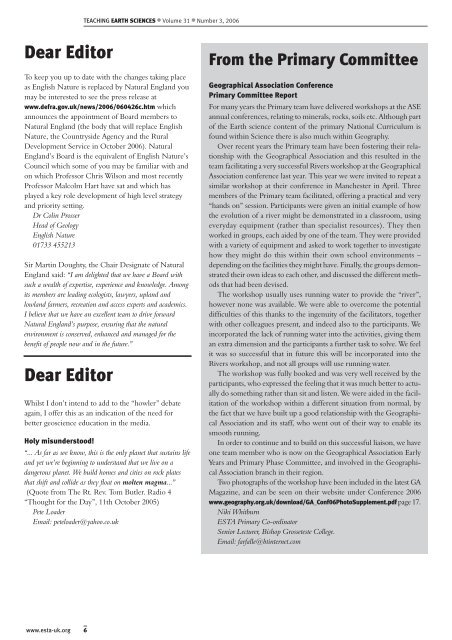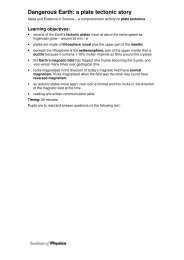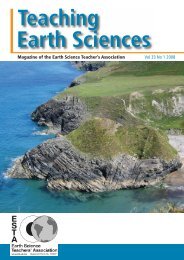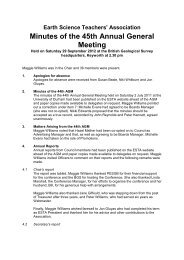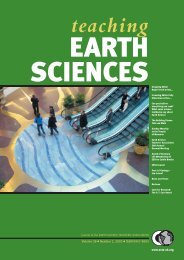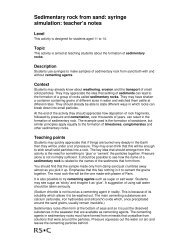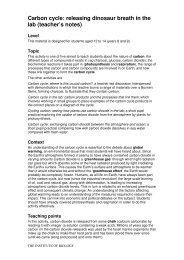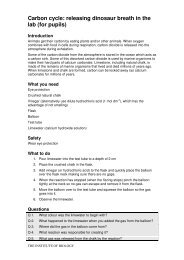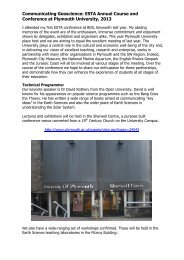teaching - Earth Science Teachers' Association
teaching - Earth Science Teachers' Association
teaching - Earth Science Teachers' Association
You also want an ePaper? Increase the reach of your titles
YUMPU automatically turns print PDFs into web optimized ePapers that Google loves.
TEACHING EARTH SCIENCES ● Volume 31 ● Number 3, 2006<br />
Dear Editor<br />
To keep you up to date with the changes taking place<br />
as English Nature is replaced by Natural England you<br />
may be interested to see the press release at<br />
www.defra.gov.uk/news/2006/060426c.htm which<br />
announces the appointment of Board members to<br />
Natural England (the body that will replace English<br />
Nature, the Countryside Agency and the Rural<br />
Development Service in October 2006). Natural<br />
England’s Board is the equivalent of English Nature’s<br />
Council which some of you may be familiar with and<br />
on which Professor Chris Wilson and most recently<br />
Professor Malcolm Hart have sat and which has<br />
played a key role development of high level strategy<br />
and priority setting.<br />
Dr Colin Prosser<br />
Head of Geology<br />
English Nature<br />
01733 455213<br />
Sir Martin Doughty, the Chair Designate of Natural<br />
England said: “I am delighted that we have a Board with<br />
such a wealth of expertise, experience and knowledge. Among<br />
its members are leading ecologists, lawyers, upland and<br />
lowland farmers, recreation and access experts and academics.<br />
I believe that we have an excellent team to drive forward<br />
Natural England’s purpose, ensuring that the natural<br />
environment is conserved, enhanced and managed for the<br />
benefit of people now and in the future.”<br />
Dear Editor<br />
Whilst I don’t intend to add to the “howler” debate<br />
again, I offer this as an indication of the need for<br />
better geoscience education in the media.<br />
Holy misunderstood!<br />
“... As far as we know, this is the only planet that sustains life<br />
and yet we’re beginning to understand that we live on a<br />
dangerous planet. We build homes and cities on rock plates<br />
that shift and collide as they float on molten magma...”<br />
(Quote from The Rt. Rev. Tom Butler. Radio 4<br />
“Thought for the Day”, 11th October 2005)<br />
Pete Loader<br />
Email: peteloader@yahoo.co.uk<br />
From the Primary Committee<br />
Geographical <strong>Association</strong> Conference<br />
Primary Committee Report<br />
For many years the Primary team have delivered workshops at the ASE<br />
annual conferences, relating to minerals, rocks, soils etc. Although part<br />
of the <strong>Earth</strong> science content of the primary National Curriculum is<br />
found within <strong>Science</strong> there is also much within Geography.<br />
Over recent years the Primary team have been fostering their relationship<br />
with the Geographical <strong>Association</strong> and this resulted in the<br />
team facilitating a very successful Rivers workshop at the Geographical<br />
<strong>Association</strong> conference last year. This year we were invited to repeat a<br />
similar workshop at their conference in Manchester in April. Three<br />
members of the Primary team facilitated, offering a practical and very<br />
“hands on” session. Participants were given an initial example of how<br />
the evolution of a river might be demonstrated in a classroom, using<br />
everyday equipment (rather than specialist resources). They then<br />
worked in groups, each aided by one of the team. They were provided<br />
with a variety of equipment and asked to work together to investigate<br />
how they might do this within their own school environments –<br />
depending on the facilities they might have. Finally, the groups demonstrated<br />
their own ideas to each other, and discussed the different methods<br />
that had been devised.<br />
The workshop usually uses running water to provide the “river”,<br />
however none was available. We were able to overcome the potential<br />
difficulties of this thanks to the ingenuity of the facilitators, together<br />
with other colleagues present, and indeed also to the participants. We<br />
incorporated the lack of running water into the activities, giving them<br />
an extra dimension and the participants a further task to solve. We feel<br />
it was so successful that in future this will be incorporated into the<br />
Rivers workshop, and not all groups will use running water.<br />
The workshop was fully booked and was very well received by the<br />
participants, who expressed the feeling that it was much better to actually<br />
do something rather than sit and listen. We were aided in the facilitation<br />
of the workshop within a different situation from normal, by<br />
the fact that we have built up a good relationship with the Geographical<br />
<strong>Association</strong> and its staff, who went out of their way to enable its<br />
smooth running.<br />
In order to continue and to build on this successful liaison, we have<br />
one team member who is now on the Geographical <strong>Association</strong> Early<br />
Years and Primary Phase Committee, and involved in the Geographical<br />
<strong>Association</strong> branch in their region.<br />
Two photographs of the workshop have been included in the latest GA<br />
Magazine, and can be seen on their website under Conference 2006<br />
www.geography.org.uk/download/GA_Conf06PhotoSupplement.pdf page 17.<br />
Niki Whitburn<br />
ESTA Primary Co-ordinator<br />
Senior Lecturer, Bishop Grosseteste College.<br />
Email: farfalle@btinternet.com<br />
www.esta-uk.org<br />
6


